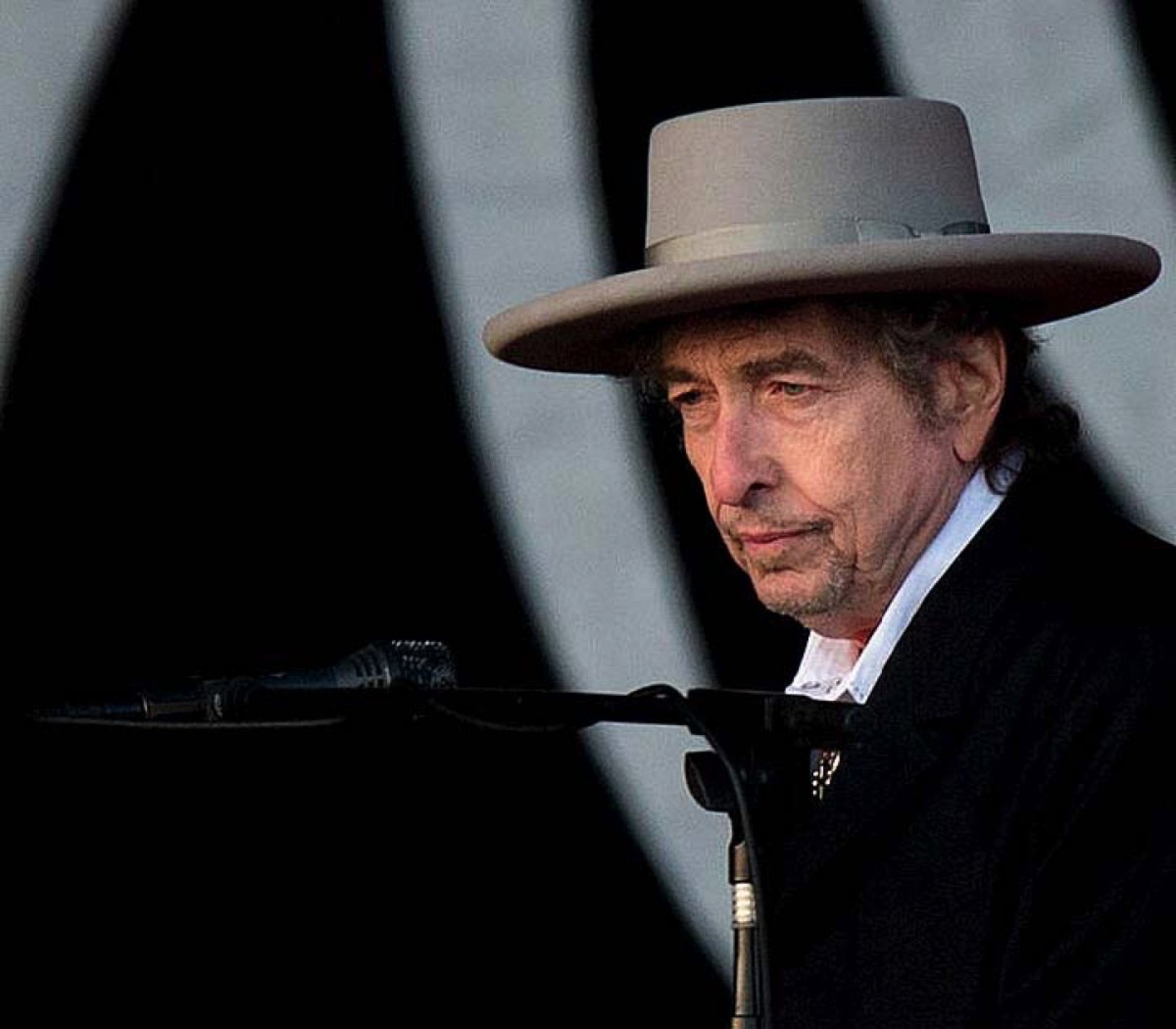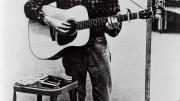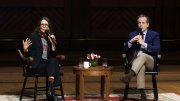It took six months for Richard Thomas to draft the manuscript for his newest book, Why Bob Dylan Matters, a study, among other things, of the songwriter’s deep and abiding connection to the poets of ancient Greece and Rome. Thomas sat down at his keyboard a couple of weeks after the announcement last fall of Dylan’s Nobel Prize in literature, and by the following spring, the pages were in his editor’s hands. “I’m not sure how I did it,” he says.
In truth, though, the Lane professor of the classics—whose freshman seminar “Bob Dylan” always fills up fall-semester classrooms—has been working on this book for a very long time. In 2001, he listened to Love and Theft a few days after the album was released and heard Virgil’s words singing back to him in Dylan’s voice. “I’m gonna spare the defeated—I’m gonna speak to the crowd,” Dylan rasps in “Lonesome Day Blues,” the fifth track. “I’m gonna teach peace to the conquered, I’m gonna tame the proud.” This was the Aeneid. The language was unmistakable. Virgil’s lines, translated from book six of his epic, read like this: “Remember Roman, these will be your arts: / to teach the ways of peace to those you conquer, / to spare the defeated peoples, tame the proud.” It turned out that Thomas’s two lifelong obsessions—Bob Dylan and the classics—were intertwined.
Academics have been poking around Dylan’s oeuvre since at least the 1970s, sifting for clues to his enigmatic meanings and origins and influences. But in the past 10 years or so, scholarly “Dylanologists” have begun truly plumbing the depths, dredging up connections to—and often almost verbatim quotations from—Milton, Keats, Tennyson, Pound, Eliot, Shakespeare. In Why Bob Dylan Matters, Thomas—who reckons he has seen Dylan in concert perhaps 80 times over the years—adds Rimbaud, Twain, Burns, and the Civil War poet Henry Timrod to the list. And of course, the ancients. His book is the first, Thomas believes, to approach Dylan from a classics perspective.
It is also the first to offer a long look at one of the artifacts in the newly opened Bob Dylan Archive in Tulsa: a small spiral-bound notebook containing drafts of what would become “Tangled Up in Blue.” (In March 2016, the George Kaiser Family Foundation purchased from Dylan his career-spanning collection of 6,000-plus artifacts. The archive opened to scholars earlier this year; a Bob Dylan Center with public exhibits is planned for 2019.) The song drafts of “Tangled up in Blue,” crammed with additions and cross-outs and a list of rhyming words, reveal, Thomas says, a writing process not unlike what records show of Virgil’s: a morning spent composing or reciting lines, “then going back, deleting, changing, licking into shape.”
Thomas, who was raised in New Zealand, began learning Latin at nine. He began learning Dylan four years later, when “Blowin’ in the Wind” arrived on the local airwaves. His church choir performed the song in 1964, while watching the U.S. civil-rights movement from afar. A decade later, Thomas was packing Blonde on Blonde into the trunk he shipped from Auckland to Ann Arbor, Michigan, where he would soon start graduate school in the department of classical studies. That album was one of only two he brought with him to the States (the other was Songs of Leonard Cohen), along with his well-thumbed undergraduate copies of Virgil and Homer, Horace, Ovid, Sappho, Catullus.
After Love and Theft, Thomas began listening for other echoes of antiquity in Dylan’s songwriting (and in his interviews and press conferences and memoirs) and discovered a whole universe of them, going back almost to the beginning. In songs like “If You See Her, Say Hello,” from Blood on the Tracks, an album recorded in 1975 as Dylan’s marriage was beginning to break up, Thomas hears the lyric poet Catullus, whose pungent verses on the pain of lost love and the tumult of modernity are some of the best, he says, in literature—sharp and electrifying and revolutionary. Shimmering behind 1978’s “Changing of the Guards,” a song whose overt imagery is Christian, lies a deeper resonance—traceable in an earlier draft—that points Thomas to Virgil again, this time the poet’s messianic Eclogue 4, which describes a boy who will become a god and rule the world.
Dylan’s more audacious borrowing—some have called it stealing, a charge Thomas answers with a cheerful-but-firm explanation of creative theft in art and T.S. Eliot’s famous passage about good poets—began much later, likely with Love and Theft or 1997’s Time Out of Mind. That’s when Dylan started embedding whole lines and phrases from other works into his own lyrics, “activating” and transforming them, Thomas says. His book maps out the correspondences between Dylan’s 2006 album Modern Times and Ovid’s poems of exile, in Tristia and the Black Sea Letters. In the album Tempest a few years later, Thomas writes, Dylan channels Odysseus, soaking up lines and images from Homer’s great epic, cloaking himself in the character of the hero. “I’ll strip you of life, strip you of breath, ship you down to the house of death,” Dylan sings in a version of “Early Roman Kings,” nearly word for word from book nine of the Odyssey.

Dylan performing in England in 2012. Age has added “compelling” edges and layers of meaning to the singer’s voice, Thomas says.
Photograph by Ben Stansall/AFP/GettyImages
A disarmingly personal early chapter of Why Bob Dylan Matters chronicles the trip—a pilgrimage, really—that Thomas and several other Dylanologists took in 2007 to the singer’s hometown: Hibbing, Minnesota. They visited his childhood home and the high-school auditorium where his band belted out Little Richard; they listened to a talk by Dylan’s charismatic former English teacher. Thomas, as the classicist in the group, was looking for something else, too: traces of Dylan’s early interest in ancient Rome and Greece, “our shared bond.” He finds it in a yearbook and later a school newspaper column on 15-year-old Dylan’s Latin Club experience; and in the movie theater down the street, once owned by Dylan’s uncle, where the young singer must surely have seen some of the same 1950s films that exposed Thomas to antiquity as a boy: Julius Caesar, Jupiter’s Darling, Helen of Troy, Alexander the Great, Spartacus. “Whatever we think we are doing on such journeys,” Thomas writes, “what moves us is the sense of being at the wellspring of artistic creation, where creative genius began to form the art that would become central to our own lives and imaginations.”
Listening to Thomas talk about Dylan and his place in the firmament of classical literature, it becomes clear that this scholarship is not a sidelight to his work on Virgil and Horace and Homer but an integral part of it. One reason he sees so many threads between Dylan and the ancient poets is because he considers Dylan to be one of them, an artist writing classic texts that outlast his own time. “It’s the same river,” Thomas says. “Just a different stage of it.”









